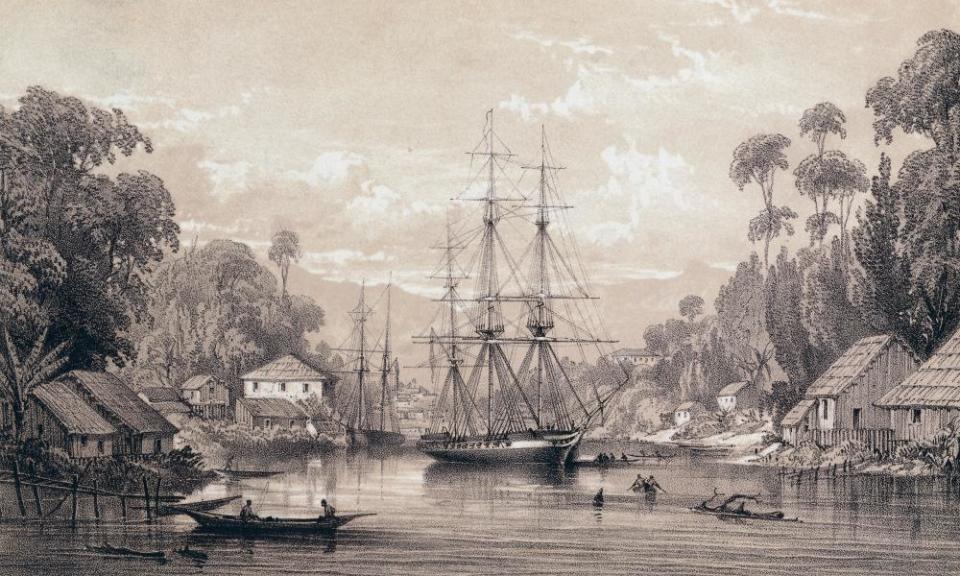Islands of Mercy by Rose Tremain review – a globe-trotting adventure

The central figure of Rose Tremain’s new novel is Jane Adeane, a young woman of towering height who is convinced that one day “she and her magnificent inches would accomplish something the world would find extraordinary”. For the time being she assists her father in his work as a surgeon in Victorian Bath, ministering to patients who flock to the city in search of a water cure. The fact that she does this dressed all in white earns her the nickname “the Angel of the Baths”, but it also makes her the object of the unwanted “sexual and monetary ambition” of her father’s assistant, Dr Valentine Ross. After rejecting Ross’s proposal, Jane decamps to London, seeking refuge with her aunt Emmeline, a successful painter who introduces her to bohemian London society.
The narration weaves together the close third-person perspectives of a large cast of characters. Jane’s love affair with Julietta Sims, a married woman who delights in promiscuity, epitomises the kind of unorthodoxy that will reveal to Jane the dissatisfactions of her own dull conventionality. It’s the novel’s best section, rendered in prose so supple it will remind you of Tremain at her best, in novels such as The Colour and Music and Silence, and conjuring vocabulary for the experience of being imprisoned and liberated all at once. Sexual abandon is experienced as “a kind of near-drowning in some dark element into which she had never before fallen”.
Empire is a form of refuge in the novel. The Englishmen seek sanctuary in ways that involve them violating the spaces of others
This strong passion is one of the many forms of escape interrogated in the novel, which is all about how, where and with whom we seek sanctuary. As the action moves between Bath and Borneo, it gestures also towards the idea of empire as a form of refuge. Most of the Englishmen in this novel seek sanctuary in ways that involve them violating the spaces of others, as exemplified in the menacing desperation of Ross’s addresses to Jane. Even though he deplores “the white man’s desire to discover ‘lost tribes’ in parts of the world nobody had yet mapped, being inclined to think that these people might be happy in their ‘lostness’ and living lives of quiet content”, he fails to recognise how this is mirrored by his own rapacious desire, and her recoiling ambivalence. Another male character, Sir Ralph Savage, is an example of exactly the sort of white man Ross denigrates, having left his homeland in search of a place where he can convince himself of his own exceptionalism. Savage acts as a local “rajah” in Borneo, a self-described “lover of young men who believes that he alone is the guarantor of his subjects’ happiness yet has achieved nothing toward that end other than overseeing construction of a road that goes no further than his own property”.
Related: Biggest books of autumn 2020: what to read in a very busy year
This makes for a striking comparison: most of the women’s stories in Islands of Mercy are triumphant, and beautifully told; by contrast, the medical men are helpless without them, and the preening English rajah is in fact a diminished nobody, more Basil Fawlty than degenerate Kurtz. However, in the light of this amplification of women’s voices, it is difficult to know what to make of the relative silence of Savage’s subjects. In one scene he observes a group of Chinese workers, who with their “small, slim bodies and their wide conical straw hats, [appear to him] … to resemble little mushrooms, bobbing out, scrabbling for a place in the earth”. It’s a reductive image, reflecting the homogenising perspective of a coloniser. But nowadays a historical novel in which “lost tribes” remain lost runs the risk of appearing out of step. Tremain – who, after all, is one of the best novelists writing today – does not quite make this mistake. She has Savage’s servant, Leon, whom he has taken as his “primary bed companion”, articulate the frustration of having to kowtow to a buffoon: when Sir Ralph shows him the completed Savage Road, he exclaims: “White and strong, Rajah, Sir – just like you and the British empire!” Leon is also as blunt and clear-sighted as any of the female characters, pointing out, for example, that the Englishmen are thieves: “You come. Take our gold. Sail away.”
Yet, although we learn that Leon is the brains behind Sir Ralph’s operation, on occasion he seems stuck in an eternal, child-like petulance. This flimsiness of character is perhaps intended to underscore how his relationship with the rajah can only dehumanise them both, the opposite of the tender rapprochement between Julietta and Jane. During an encounter with Savage, Leon is torn between an obstinate wish “to say that he was tired of being subservient to the rajah” and the stirrings of “a feeling he refused to name as love”. It’s a scene that could speak volumes about coercion, about the bitter, transactional nature of his survival, about power and powerlessness; but it also left me feeling that, so far as he was concerned, I had only caught a glimpse of a story that has yet to be told.
• Islands of Mercy by Rose Tremain is published by Chatto & Windus (£18.99). To order a copy go to guardianbookshop.com. Delivery charges may apply.

